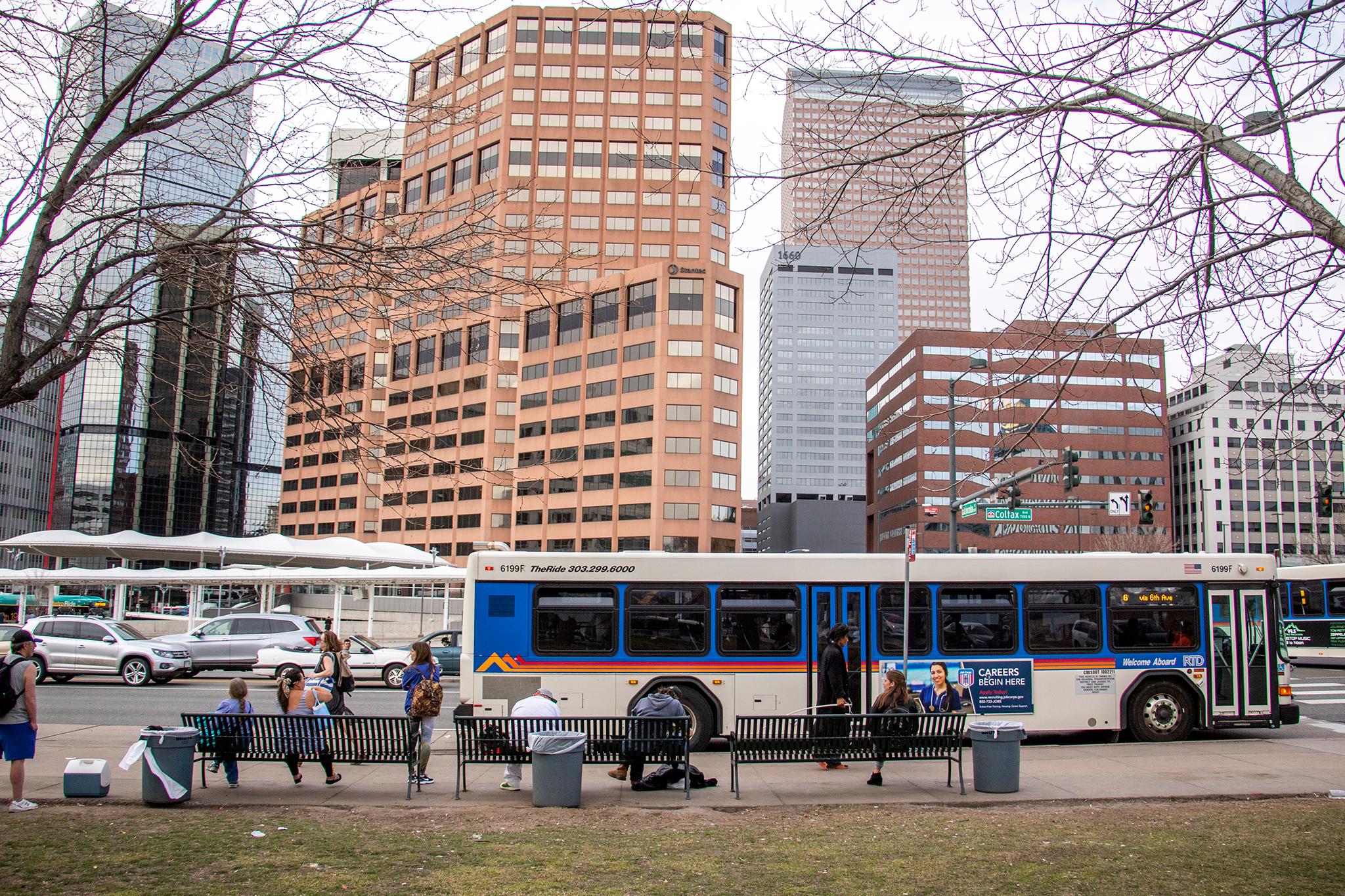
Update 4/3: RTD will allow rear-door boarding and will waive fares effective Sunday, 4/5.
The Regional Transportation District says it won’t institute rear-door boarding on its buses, as many other public transit agencies have to fight the coronavirus.
Passengers in cities like New York, Philadelphia and Los Angeles now board and exit buses from the rear door to keep them away from bus drivers.
But RTD’s Chief Safety Officer Mike Meader told the agency’s board on Tuesday that they weren’t planning on making such a change anytime soon. He laid out a few reasons:
- The configuration of some bus stops would require the driver to stop with the front of the bus in traffic to align the back door with the stop. The presence of snow could further complicate that.
- Some stops aren’t compliant with the Americans with Disabilities Act because they were grandfathered in. And drivers are better able to assist disabled passengers at the front of the bus. Further, wheel-chair ramps are at the front of the bus.
- Drivers would have less visibility and less control over who’s allowed to board the bus.
- Passengers walking by an operator at the front of a bus is relatively non-risky. "It really isn't, from the perspective of public health, a major risk,” Meader said. “It's not even considered a medium to high risk from the transit operator perspective.”
“We're concerned about the safety of our operators, concerned about the safety of our customers. We feel that minimizing those risks is more important at this particular point in time,” Meader said.
So RTD’s passengers will continue to board buses at the front. That’s despite pressure from the drivers’ union, which is concerned about safety. The situation is changing so rapidly, said Lance Longenbohn, president of the ATU-1001, from the CDC reconsidering whether masks are helpful in preventing spread to the knowledge of how far the virus can travel, that union leadership is trying to err on the side of caution.
“I haven't been presented with any valid objections to convince me that back-door boarding is not the right thing to do,” Longenbohn said. “Our drivers are scared. And I can’t blame them.”
"I'm telling my operators to do whatever it is that makes them feel safe,” he added.
No operators have tested positive for COVID-19, the disease caused by the coronavirus (though there was one false alarm), Longenbohn said.
But board member Shontel Lewis said she’s spoken with a handful of operators who’ve shown symptoms but haven’t been able to get tested. She thinks RTD should waive fares and implement rear-door boarding.
“This is about limiting the spread and limiting exposure to people,” she said. “We’re talking about people — it’s so, so important to prioritize people in the center of our conversations.”
Advocates for disabled riders also want rear-door boarding, with exceptions for passengers who need to use a ramp.
“This will help lower the number of contacts drivers’ are forced to experience when riders board the front door,” Jaime Lewis, the Colorado Cross Disability Coalition’s transit advisor wrote in an email to board members.
Lewis also said RTD should waive fare collection and that drivers should be wearing face masks in order to prevent the spread of the virus from drivers to passengers. Meader said RTD has ordered enough face masks, which are in short supply around the world, to provide them only to service and cleaning workers.
“They’re the priority right now,” Meader said.
RTD’s drivers are also not preventing people from boarding already crowded buses, as is the current practice in other cities like Philadelphia.
“People are getting on the buses and policing themselves,” Meader said.
Drivers are instead being told to ask dispatch for a backup bus to alleviate crowding. The ATU’s Longenbohn said RTD needs to do a better job of anticipating where more buses are needed.
“None of this is rocket science,” he said. “And we’re not the only ones who are needing to address this problem.”
Ridership on RTD’s system has fallen 70 percent in recent weeks as public life has largely disappeared in metro Denver. The agency will cut service by about 40 percent starting April 19. It’s unclear so far just how much revenue RTD will lose over plummeting ridership and a decline in sales tax income.
Editor's Note: This story has been updated to remove a reference to transit agencies in Washington, D.C. and Minneapolis, attributed to RTD's Mike Meader. Spokesmen for both denied the factual basis of the comment, and so it has been removed from the story.









